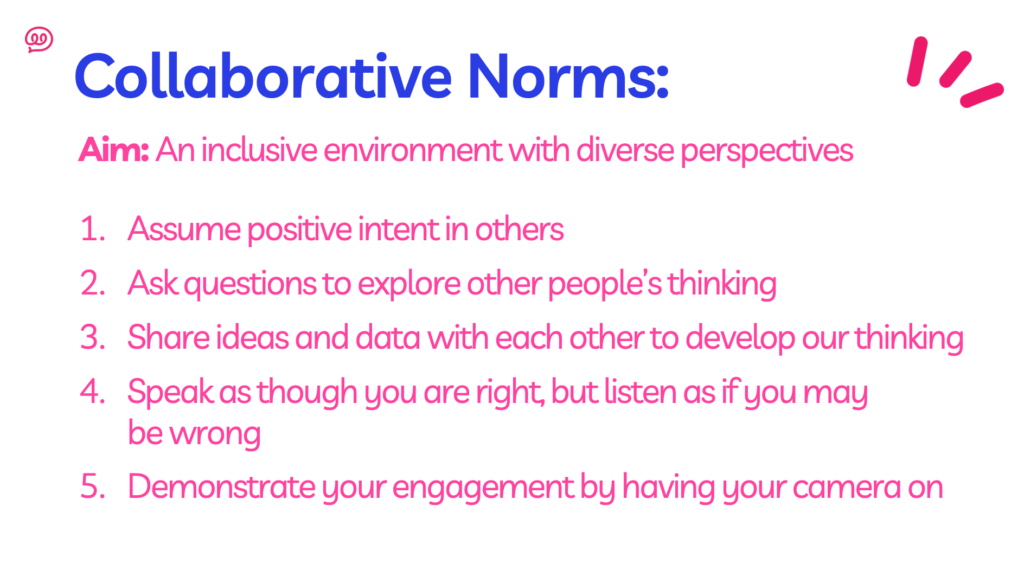🧑💻 Join our Free Info Session to learn what PeerSphere can do for you!
Join our Free Info Session to learn what PeerSphere can do for you!
PeerSphere Learning Communities
Host Handbook 2024-2025
How to use the Hosts Tracker Sheet:
Table of Contents
Our Purpose
PeerSphere is a Peer Learning Community. We build thriving communities of education professionals, who collaborate to solve problems. In these communities, members discuss timely and relevant topics and share resources that will immediately benefit them and their school. Most importantly, our members will develop strong and lasting connections with other professionals who can support each other long into the future.
Target audience / participants
We want to support educators and school administrators who are traditionally underserved by existing PD opportunities and conferences. Imagine Julie, a whole school librarian at an international school somewhere like Xian, China. Julie is the only whole school librarian in her city. She loves her job and is full of ideas but often feels isolated. She is crying out for the opportunity to broaden her perspective on a range of ideas and issues related to her job. She’s curious about what other librarians are doing and would love to collaborate to craft innovative new practices. We believe there’s someone like Julie in every school and in every role that we are providing a community for.
We have developed a list of problems (pains) that our target audience might be facing and devised how being a member of one of our communities will help to solve them (potions). These are quite general because they cover all communities. You might want to think about any pains that are specific to your community and how you could help your members to solve them.
| Pains | Potions |
| 1. Starving for the right insights 2. Short on quality resources 3. Working in silos 4. Starving for innovation 5. Feeling isolated 6. Feeling like they’re the only one | 1. Learn about topics that are timely and relevant to your needs 2. Share and receive great ideas, resources, and practices 3. Collaborate on common professional inquiries 4. Broaden your perspective from peers who understand your regional context 5. Feel seen and heard by a community experiencing similar challenges 6. Better understand your role relative to others |
Timeline and Commitments for Hosts
Without an expert host like you leading each community, PeerSphere would not be possible. We want to ensure you feel supported in delivering the best experience for our members. Therefore, we will provide you with induction training and time to test out the platform and tools so that you are ready to hit the ground running in September.
We recognise there’s a broad range of previous experience in hosting live sessions and building communities of practice. We want to enable each of you to thrive with the level of support you desire.
The following is a draft timeline to indicate the key commitments involved for hosts. Dates are subject to change and will be confirmed at least a month in advance.
Note that there is a window of time for each batch of live sessions. You have flexibility over the date and time within these windows for each live session. You’ll learn more about this in Step 2 of your induction.
| Engagement/Event | Dates |
| Induction Step 1 (30mins – Asynchronous) | Before May 20 |
| Induction Step 2a/b (90mins – Synchronous) | May 23 – May 28 |
| Induction Step 2c (90mins – Asynchronous) | May 23 – June 6 |
| Confirm live session dates (Asynchronous) | June 6 |
| Hosts Training: Preparing for Live Session 1 (90mins – Synchronous) | Aug 12-16 |
| Soft launch of Peer-Sphere.com platform for members | Aug 19 |
| Pre-Session 1 Logistics Call (30mins) | Oct 9 – Nov 5 |
| Live Session 1 (90mins) | Oct 14 – Nov 8 |
| Live Session 2 (90mins) | Nov 11 – Dec 6 |
| Hosts Mid-year Training Session (90mins – Synchronous) | Jan 13 – Jan 17, 2025 |
| Live Session 3 (90mins) | Feb 17 – Mar 14 |
| Live Session 4 (90mins) | Mar 17 – Apr 18 |
| End of Year Celebration (60mins) | TBC – May 2025 |
*We’ll share some dates to avoid due to national holidays in China/SE Asia
Induction Step 1 - Complete Induction Survey + MoU
- Read through the Memorandum of Understanding (linked here) and the Seeking Head of School approval form (linked here).
- Then complete our Host Induction Step 1 Survey ASAP:
- New Hosts only (linked here)
- Returning Hosts only: (linked here)
- To complete the survey, you’ll need a profile photo, community blurb and a short biography. See the exemplar (linked here).
Non-negotiables
This handbook is intended to provide practical guidance as a foundation for you to build on with your expertise and creativity. The baseline expectations for hosts have been outlined in the Memorandum of Understanding (MOU) and the Code of Conduct. A reminder of the requirements for all hosts:
It is expected that any community host engaged by PeerSphere will abide by PeerSphere’s Code of Conduct, which can be accessed from this link. Please appreciate that members attending events coordinated by PeerSphere will participate from across Asia and further afield, will be from a variety of backgrounds and that some will not speak English as their mother tongue. We would ask that you try to avoid using examples that are specific to only one country and/or culture and exert caution when making any cultural references as these are likely to not be relevant to a large part of the audience.
Ultimately, our aim is to engage our members and respond to what they need. By initiating discussions, our communities should then gain their own momentum. To this end, please:
- Share a copy of all live-session slide decks and readings on the community platform.
- During live sessions, uphold healthy group norms to nurture an inclusive community.
- At least once per month, post something on your community’s discussion board e.g., reflection question, provocative discussion starter, a reading, video, quotes, etc.
Induction Step 2a - Book Onboarding Call
Task: Book Onboarding Call
Due: Monday 13 May 2024
This is an invitation to join one of the upcoming calls to kick off hosts onboarding for 2024-25. Attendance at one of these calls is a requirement for new hosts and optional for returning hosts – would be great to see you all there!
To ensure we find times that work for everyone, please indicate your availability for the call using Doodle (Linked here):
Please identify your availability for all the slots by Monday 13 May, or ASAP if you’re joining us after this date.
You only need to attend one call and we will confirm your call by email.
Tip: Doodle usually detects your timezone so the times displayed for you should be adjusted to where you are.
Join a live call where we will explore the purpose of our communities, share success stories from this year, and get you oriented with the steps towards welcoming our members in September.
Induction Step 2b i - Opt in for a Sprint
Task: Opt-in for Community Sprint (Optional)
Due: Wednesday 29 May 2024
This is an exciting experiment that we believe will enhance our community engagement and provide even more value to our members next year.
Why We’re Experimenting with Community Sprints:
Based on feedback from some of our members and hosts, we’ve learned that sessions can feel too spaced out, especially with the break from December to March. To address this, we’re going to experiment with Sprint Seasons for some communities in 2024-25. All this means is that a community would run its 4 live sessions every 2 weeks, instead of from Oct-Apr. We think this will help maintain momentum and create opportunities for members to engage in multiple communities more easily. There’s only one way to find out!
How Sprint Seasons Will Work:
A Sprint Season will consist of 4 live sessions happening every 2 weeks. We plan to run two Sprint Seasons:
- Season 1 (October to December)
- Season 2 (February to April)
Community Participation in a Sprint:
Participation in the sprints is up to you as host/co-hosts of your community. Opt-in if you want to do it. If not, your community will follow the regular schedule. We’ll cap the number communities in each sprint season at 10 this year. Here’s how we’ll proceed:
- Check with your co-host and, if you want to express interest in running your community as a Sprint, complete this form by 5pm (HKT) Wednesday 29 May. It’s first come, first served.
- Wait for confirmation that your community has been selected for a Sprint (We’ll run a maximum of 10 per season this year. Any communities not selected will run with the regular schedule).
- Confirm the dates/times for your sessions using our scheduler (see Step 2b ii below…)
Induction Step 2b ii - Schedule Live Sessions
Task: Schedule Live Sessions 2024-25
For hosts of AIMS communities only, please use this guide to book your sessions. The link to the scheduler is embedded in the guide.
For all other communities, please use this guide* (linked here) To book your sessions. The link to the scheduler is embedded in the guide.
*If you have opted to run your community as a Season 2 Sprint, see additional instructions here:
Season 2 live sessions will run every 2 weeks from February to April. When scheduling your live sessions, follow the guide (linked above) but with this adjustment:
- Book 2 live sessions in Live Session 3 (for example: Wed 19 Feb at 5pm and Wed 05 Mar at 5pm)
- Book 2 live sessions in live Session 4 (for example: Wed 19 Mar at 5pm and Wed 16 Apr at 5pm*) *There’s a longer gap here because of the April holidays. Therefore all 4 of your live sessions will be scheduled for 2025.
Additional Info:
- Slots are taken on a first come, first served basis so get in quick!
- When all hosts have booked their slots, Ewen will confirm your session dates and times in the tracker sheet. He will let you know in the unlikely event that we cannot fulfill one of your time slots for a session.
- Once the dates are published on our website, we can only change the dates in exceptional circumstances. Please take some time to identify when you will be available and add the live sessions to your calendar to avoid scheduling conflicts.
Induction Step 2c - Log in to your PeerSphere Members' Account
Getting started:
Say hi to other hosts:
- Log in to your PeerSphere account here
- Click on the ‘Communities’ button on the top navigation bar
- Then click ‘All Groups’ and find ‘Community Hosts’ in the list. You can search for it using the search bar in the top right corner.
- Say hi to the other hosts – reply to my post on the feed or make your own post.
Complete your profile:
- Add a profile photo and key details to your profile (Click here for a video demo).
- Click on your name in the top right corner and select ‘Profile’ from the drop-down menu.
- Click ‘Profile Photo’ on the navigation menu on the left side and follow the instructions to upload a photo. Please use a professional profile photo, preferably the same one that’s on the PeerSphere/ACAMIS websites.
- Then click ‘Edit’ and complete the empty profile fields (e.g. school/organization, location etc.).
That is all you need to do for now. Feel free to join other communities too – you have a full membership. Note that you’ll get notifications for every community you join, including invitations to their live sessions.
How to use the Hosts Tracker Sheet:
This is the single point of truth for all the links and templates that you’ll need as you prepare to host your community.
Key for tracker columns:
As a host, you must track your community’s row but you are only responsible for completing the columns that have a heading with a green shading.
| Heading Shade | Purpose and who is responsible for that column |
| Info and Links completed by PeerSphere | |
| Checks confirmed by PeerSphere | |
| Checks confirmed by Hosts |
Create initial survey questions for your community:
Task: Create initial survey questions for your community – Due Mon 13 Jan (Season 2 Hosts)
Every member of your community will be asked to complete an initial survey after they sign up. This survey is a gold mine of information about your members. Last year’s hosts used it often. What would you like to know about your members?
Here are the steps:
- Go to your community resource folder by going to Column N of the Host Tracker (Bookmark this folder because you’ll use it a lot!)
- The survey template file is titled either Members Initial Survey or CHINESE Members Initial Survey depending on the language of your community
- All the Chinese content in the exemplar is copied from a translation tool so excuse any errors. It’s just an exemplar for you to edit.
- This file is a standard template with a list of suggested questions
- Note: For returning communities, the template includes last year’s questions for you to work as a starting point
- Create your community’s initial survey by editing this file
- You can edit this file directly or paste your questions in this file
- You can sample the questions or create your own questions
- Indicate the type of the question in a {} before the questions (e.g. {multiple choice}, see the sample questions for examples)
- Available question types: multiple choice, yes no, rating, long text, short text
- For Rating questions, please also indicate the range of the ratings
- E.g. If 1 = completely disagree and 6 = completely agree, add {6} after the question type and before the question
- The questions types (e.g. {multiple choice}) must stay in English. Only the content of the questions should be in Chinese if your community is hosted in Chinese
- Consult with your co-host while working on this survey
- After finalizing the survey questions, go to Column AA of the Hosts Tracker and put in Yes
- We had a good response rate from members for this survey last year but a much lower response rate for additional surveys sent during the year, even short ones. Therefore, make this one count!
- Ask as many questions as you need to know about your community, but no more than that. The longer the survey, the lower the response rate. You will see the exemplar has 25 questions, which is long, but 20 of them require only 1 click to answer. Limit questions requiring a written response to a maximum of 5. Even better if you ask less.
Welcome Message for your Community
- A Welcome message that encourages members to introduce themselves
- Share a resource or ask a question that is aligned with the focus of your community. Many members will really appreciate having a resource that they can consider using.
Promote your community in your network:
Task: Help us find awesome members for PeerSphere!
It would be amazing if you can reach out to your network and help get more great people involved in our communities.
Here's 3 things you can do to help:
1) Share your Social Media sharing card on LinkedIn, WeChat, Twitter/X etc.
Please help us promote your community via social media and any other channels you have available such as mailing lists, faculty PD notice boards, WeChat/Facebook groups, etc. We got a fantastic response to some of these last year and the more of us who share these and comment/re-share others, the more it helps build awareness of our brand.
You can find your Social Share Card in Column V of the Hosts Tracker we have created a social graphic you can use. Here’s an example of what one looks like:
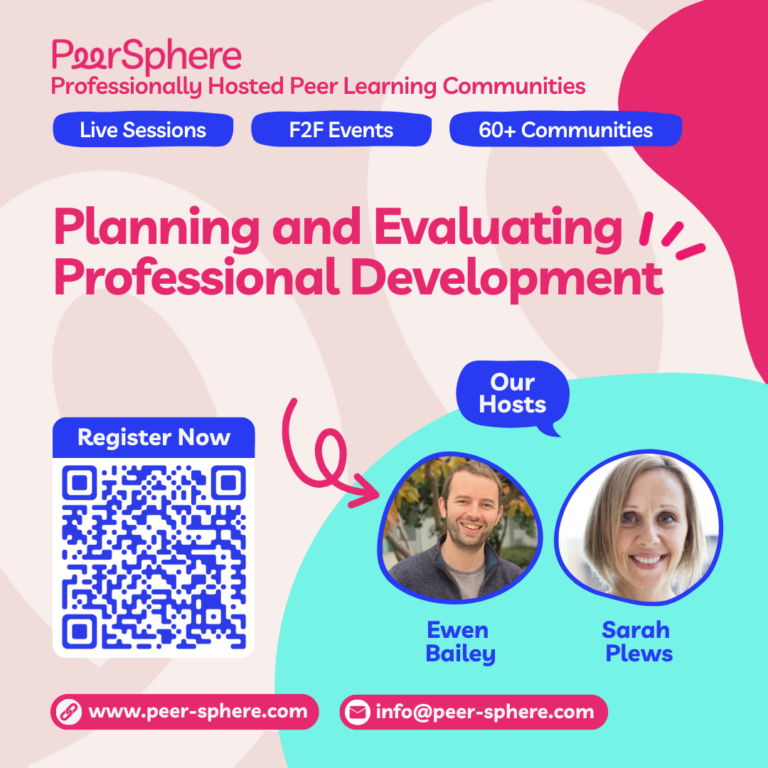
If you would like to change your photo at any time, you can submit a different one here.
Suggest Posts: Below we have some suggested language for different types of Social Media platforms, which also includes relevant tags:
Suggested Text 1: Are you looking to connect and learn with peers from other international schools throughout Asia? Then join us in the Peer Learning Community I am co-hosting! Scan the QR code on the graphic to find out more or check out www.peer-sphere.com
Suggested Text 2: I am excited to be co-hosting <community name> this year! Scan the QR code on the graphic to find out more or check out www.peer-sphere.com
LinkedIn Tags: @PeerSphere @MichaelIannini @EwenBailey #PeerSphere #Edchat #Learning #PeerLearning #PeerSphereImpact
2) Share 5x 50% Coupons:
Invite 5 people who you would love to have in your own community or you think would love to join another community. They might be a bit of an expert, someone who can be your cheerleader, or just someone who you think would love it! To sweeten the deal, we will give them 50% off the full price membership fee, meaning they can join for only USD $145.
Here’s what to do:
- Send them a private message or email inviting them to join*.
- *IMPORTANT: Do not share this coupon code on social media / group chats etc. It is only intended for sending to individuals and must not be circulated.
- Here’s a message you could send:
- <Intro> ...As a host, I can offer you a coupon for a 50% discount off the full price, so it would be USD $145. With one membership, you can join as many communities as you like!
- All you need to do is use the individual sign up form and use this coupon code: Host145
- Check the price is USD 145 before proceeding to payment.
- For more information about PeerSphere see this flyer, and check out the How it Works page for a few videos too.
- My only request is that you don’t share the coupon with anyone else
- Small print:
- If someone declines the offer, feel free to invite another contact, we want these coupons to be used 🙂
- We would prefer it if you shared these outside of your current school.
- Anyone working at a school that has buys a school pass does not need to buy a separate membership. We will provide a refund to anyone who buys an individual membership prior to their school purchasing a school pass.
- There’s more than 100 hosts so if we can each bring 5 new members, that’s more than 500 people!
3) If you work at a school, do your colleagues know about PeerSphere / ACAMIS PLC?
If not, check-in with your PD Coordinator and Ewen would be delighted to connect with them. You could share this flyer and the link to our How it Works page. The flyer includes a list of every community but the latest information can always be found on our community pages here.
Hosts Training Sessions - Aug/Sept 2024
Task: RSVP for the training sessions by Wednesday 7th Aug.
- We recognise that some of you will be unable to attend live due to other commitments. Please do your best to attend live, but a recording will be available for anyone unable to make it.
- *You will need to have an account for www.peer-sphere.com to access the Hub linked above. If you haven’t already created your account, see Induction Step 2c above for the instructions and do this ASAP.
- Session 1 – Live Session Essentials – Tuesday 13 August – 4:00-5:30pm and repeated at 7:00-8:30pm (China time)
- Facilitated by Ewen Bailey – RSVP to either the 4pm or 7pm session
- We’ll cover the key facilitation structures needed for a successful peer learning session. Looking forward to sharing the essentials of live session facilitation based on what we’ve learned from 200 live sessions last year! We have an exciting opportunity for all hosts that we’ll be announcing during the call too…
- Here’s the link to the recording for anyone that missed it.A pdf of the deck is here, which includes the breakout room notes and clickable links that were referenced on the call.
- Session 2 – Intercultural Understanding – Tuesday 20 August – 7-8:30pm (China time)
- Guest Facilitator: Aubrey Curran
- Looking for tips on how you can cater for the different cultures and nationalities in your sessions? Are you looking to engage all of your participants regardless where they come from? Join this mini-workshop with Aubrey Curran that is tailor-made for PeerSphere hosts. Aubrey is an expert facilitator and offers workshops for educators keen to upskill their facilitation skills in an intercultural context like here at Peersphere. In this session, participants will reflect on their practices as Aubrey examines multiple models and how you might take advantage of the research in your facilitations. Everything is practical, relevant and fast and you’ll never get anything gimmicky or airy-fairy from Aubrey.
- Here’s the link to the recording for anyone that missed it.
- A pdf of the reading is here too.
- If you are interested in using Aubrey’s services, see the flyer below and contact him directly about a discount coupon for PeerSphere hosts.
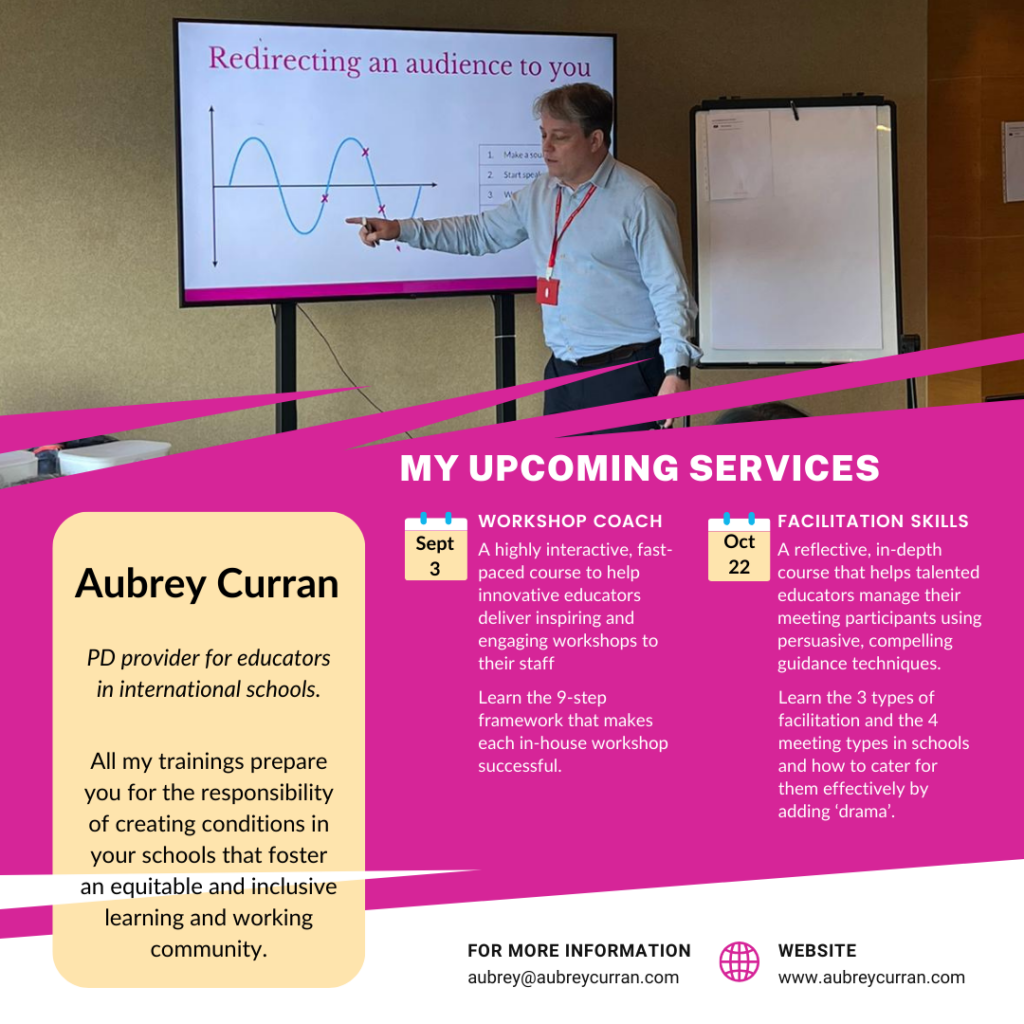
- Session 3 – Planning for a Sprint – Thursday 29 August – 4-5:30pm (only for communities doing a Sprint)
- Facilitated by Ewen Bailey
- If you’ve opted to run your sessions as a Sprint this year, this session is a great opportunity to explore the new possibilities this opens up for your community. The ideas shared her for Sprints is applicable to most communities so check it out!
- As was highlighted during the session, the spirit that these approaches are shared is to support you in developing your own approach for your live sessions based on your strengths and the needs of your community. None of the example approaches are ready to use ‘off the shelf’ and all will require tweaks based on your own good judgement to work for your community.
- Session 4 – Drop-in / Q&A – Thursday 12 September – 4:30-5:30pm
- Q&A + Scenarios – We’ll run through a few ‘what if’ scenarios and answer your questions as you prepare for a successful first live session.
- Facilitated by Ewen Bailey
- Please find the recording here.
- A pdf of the deck is here. Lots of clickable links in the deck so do check them out.
- Here’s the rundown of what we covered on the call:
- Checking in: Sharing how ready we feel for live session 1 + burning questions
- For anyone watching the recording, please post your questions here and I’ll follow up ASAP.
- Walk through the live session checklist
- Communicating with your Members
- Promoting your community and PeerSphere membership in your network
- Only 8 out of 600 of the Hosts 50% discount coupons have been redeemed so far. Let’s get this to 100+ before the end of September!
- Request for Feedback: Please take 2-3mins to complete this feedback survey about your experience of the hosts onboarding and training. Your perspective will help us understand what we’re doing right and how we can do it even better next time.
- Checking in: Sharing how ready we feel for live session 1 + burning questions
Guidelines for PeerSphere Community Hosts
Introduction
As a PeerSphere Community Host, you play an instrumental role in facilitating learning, collaboration, problem-solving, and the creation of lasting professional relationships within our communities. Your role is to provide an inclusive and engaging environment that fosters peer-driven learning and support.
Think of yourself as an expert scientist leading collaborative chemistry experiments. Your community is the lab where so many experiments are possible. The members of your lab will bring their own ideas and experiences to share during each experiment. As a host, you
are expected to choose the right set of elements (strategies/tools) for each live session to allow members to create amazing new reactions.
It’s common in some settings for discussions to drift towards complaints without productive outcomes. We want to ensure that when our members share their challenges, they leave with actionable solutions and a renewed sense of purpose. Let’s be the space that fosters problem-solving and inspires action, rather than lingering on problems.
Most importantly, as hosts, we are all here to help each other build amazing communities. Let’s share our challenges and collaborate to find solutions.

Key Responsibilities:
- Hosting Live Sessions – Prepare and host four 90-minute live sessions between October 2024 and April 2025.
- Foster an environment that promotes peer sharing and problem-solving.
- Establish the purpose of each session based on community needs.
- Encourage members to engage on the PeerSphere platform asynchronously.
- Share reflective questions, discussion starters, readings, videos, etc. aimed at igniting discussions.
What You Do Not Need to Do:
- You don’t need to develop workshops or design curricula for live sessions.
- You do not need to moderate posts/messages on the PeerSphere platform; we have this covered for you.
Your Role Is to Foster:
- Generative learning: Based on relevant and timely topics for our members.
- Collaboration: Encourage sharing of ideas, resources, and best practices.
- Purpose: Facilitate meaningful conversations that inspire action.
- Perspective: Broaden the members’ perspectives through mutual understanding of regional contexts.
- Inclusion: Ensure all members feel seen, heard, and understood.
Remember, you are the pillar of our communities, the facilitator of powerful connections, and the catalyst for transformative learning experiences. Thank you for your commitment to this role and to PeerSphere!
Planning and Delivering a Live Session
This section is intended to provide a foundation for all hosts to build on, which sets up every community for success. If you are an experienced facilitator and have your own preferences, we trust your judgement and hope this helps to stimulate thinking. The sky is the limit!
We know from experience that our biggest challenge is motivating our members to attend our sessions live. We are doing lots of things to encourage higher turn out during live sessions this year and one area we need your help is to confirm the focus and key details about each session at least 2 weeks in advance. This will allow us to promote every live session like an event in its own right (e.g. Flyer, email, newsfeed posts). It also gives you time to do things like recruit peer presenters and/or build momentum on the platform (e.g. by sharing a reading, a provocation, or some poll questions).
How to share the focus & key details for each live session:
- Please prepare an outline of each live session and submit the following details in this form :
- Session Title
- Objective / Inquiry Question / Outcome (pick one depending which of these you prefer)
- Promo Blurb
- The PeerSphere team will then create promo flyers for every session. For an example see here.
Here is the basic recommended structure for a live session:
- Objective/Outcome: Clarity on the purpose of your live session will help with every aspect of your session.
- Beginning: Most of your members will bring a lot of emotional and physical
baggage to a live session – They’ve either just finished a long, stressful day or they are about to start one. So, we need to help them leave their baggage at the virtual door. Ask yourself: How do you want your members to feel?- As outlined in Training Session 1 we recommend 2 general approaches to a warm up exercise in breakout rooms:
- Light-hearted / Relaxing (e.g. Live Session Element Warm Up.pptx)
- Provocative
- The key is to get members doing the warm-up activity as soon as possible, ideally around 5mins into the live session.
- Video: Watch Ewen introduce the beginning section
- As outlined in Training Session 1 we recommend 2 general approaches to a warm up exercise in breakout rooms:
- Middle: Choose one topic/activity for this part. Only do more if you are very confident you can do each activity justice and have time for an ending.
- Take time to activate member’s thinking/interest before moving to a breakout activity. If members feel rushed/confused or the ‘why’ is unclear, they will struggle to engage in the discussions.
- This section should always have at least one breakout activity with clear instructions for how to engage.
- Tip: Make sure to share task instructions in the chat so members can refer to them once they’ve gone to the breakout room.
- Click Here for some recommended elements (e.g. Insight Trading, 4Ls Protocol, Generate, Sort, Synthesize)
- Video: Watch Ewen introduce the middle section, including a demo of Insight Trading
- Ending: This is a time for reflection, where members consolidate learnings from the session and share commitments for the future. Techniques like the Virtual Parking Lot, Personal Commitment and Traffic Lights can be useful tools to encourage continuous learning and hold participants accountable.
- Tip: Always make time for an ending activity. Even if your Middle activity is running long, you are better off stopping it early than not having time for an ending. You and the members will walk away feeling much better if there’s even 5 minutes to share learning and ask questions.
- Video: Watch Ewen introduce the ending section.
- Feedback form: It is essential to share the feedback survey with members before the end of the call and ask them to complete it. We read all of it and act on anything we can to improve the experience for our members.
Technical Support
The PeerSphere team is here to support you and will provide logistical support for each live session. The goal is to allow you to be fully focused on delivering the best possible experience for our members.
One of our assistants will support each live session by:
- Launching the MS Teams call 20mins before the start time
- Recording the live session
- Admitting members to the call
- Organising break-out rooms based on your requirements
- Tracking comments/questions in chat
- Recording attendance
- Technical troubleshooting
Logistics Planning Call:
One of our assistants will reach out before each live session to schedule a 15-min Logistics Planning Call with you. The Call for Live Session 1 has to take place at least 1 day before the session.
Before the call, please confirm the following:
- You have submitted your session focuses (see Task #6 in the following section) (column AM of the Hosts Tracker)
- You have planned how you want the session to be run
- You are using the PeerSphere slide deck template to create the deck (column AJ of the Hosts Tracker)
- Ideally you would have the breakout groupings and timing ready before the call, but please feel free to check with our assistant before making any decisions
- An instant communication method other than Teams chat – This is to ensure our assistant can get ahold of you in case you have difficulties joining the session
- Your requirements for the session – This includes breakout groupings, resources or links to be shared in chat
- Screen sharing the slide deck – Our assistant will do a demo and guide you on how to share your screen, video, audio, etc., during the session
- Your MS Teams app is up to date and all system permissions are correct – Please ensure the settings remain unchanged until the live session to ensure your session goes as smoothly as possible
- Please be in touch with our assistant the days leading up to the session so we can provide additional support in time
Live Session Checklist
Like most of our Induction, this checklist is intended to give you a foundation as you prepare to host a live session, giving you the confidence to go above and beyond with your community!
Key Links:
- The Hosts Tracker Sheet
- Link to your Community Hub – Column W of the Hosts Tracker Sheet.
|
Task |
Links / Notes |
Complete |
|
1 Check the date/time of your live session (China Time: GMT+8) |
Column AH of the Tracker for live session 1 This info is also in the Sessions tab of your Community Hub |
|
|
2 Find the MS Teams link and save it |
Find link in Column AI of the Tracker for live session 1 This info is also in the Sessions tab of your Community Hub |
|
|
3 Open the Slide Deck template for your session |
Find link in Column AJ of the Tracker for live session 1 |
|
|
4 Review Initial Survey Responses from your members |
Find link in Column AC of the Tracker for live session 1 |
|
|
5 Plan your live session at least 15 days before the event |
In the Hosts Handbook, see these sections:
|
|
|
6 Session Preview: Share the focus and key details of your live session at least 10 days before the event. We will use this info to create a preview Flyer. See example here. |
Complete this form |
|
|
7 Share pre-reading / info / Questions with members in your Community Hub |
Link to your Community Hub in Column W of the Tracker
|
|
|
8 Confirm 20mins logistics call with TA This call must happen at least 48hrs before live session 1. |
You will be contacted by one of our technical Assistants (TAs) See column AK of the Tracker for your TA’s name |
|
|
9 Have you booked your live session as protected time at your school? |
We would love to have the support of your school on this |
|
|
10 Do you have a quiet space with a reliable connection for the live session? |
– |
|
|
11 Is your MS Teams app up to date? |
If your MS Teams app is not up to date it can cause big problems during a call See here for how to check + FAQs |
|
|
12 Have you downloaded an offline version of the slide deck to present with? |
Remember to have the shared version of the Ppt open in your browser too |
|
|
13 Join the live session call 15mins early |
Find link in Column AI of the Tracker for live session 1 |
|
|
14 Allow time for members to complete the feedback survey at the end of the call |
See the last slide on your slide deck for the link + QR Code |
|
Have a wonderful session with your community!
15. Post Session Tasks:
- Within 24hrs of your session, share 3-4 main take-aways here. Our TAs will take this and create a session summary to share with members. See an example here.
- Guidance: We need specific examples that were learned/discovered, or even a new question that emerged during the session. Please summarise something from what was shared by participants in writing or something from the discussions that stuck with you. Sometimes a good quote works well. Regardless, the goal is to capture some key learning/themes that emerged during the session.
- Example: See an example summary report here from a previous session to give you an idea of what the finished product will look like. This is by no means a perfect example and yours doesn’t need as much content as this one. It just needs to reflect a few key things from the session that were not known going into it. Ideally, these take-aways will entice someone to open the recording and watch it or attend the next session.
- Please also take 2-3 mins to complete the live session Hosts Feedback/Reflection here.
- This will help us to share positives with other hosts and identify ways we can improve for the next sessions.
- There’s a request at the end of the survey to record a short video testimonial. This would be really helpful for us to share with your community and on LinkedIn.
- Session Feedback: Members feedback of your live session will be available after 48 hours in your community resources folder.
- Next Session Prep.: Finally, please look ahead to your next live session and ensure you submit the session preview 2 weeks in advance. If you’re running Sprint Sessions, please submit your session preview form within 3 days.
Facilitation Coaching:
You can now express your interest in Facilitation Coaching here.
Deadline: Monday 26 August 2024
Why Facilitation Coaching?
This is a gift for PeerSphere co-hosts with two aims:
- Offer co-hosts the opportunity to grow as facilitators, regardless of their previous experience.
- Create opportunities for the development of all hosts by sharing examples of good practice in the Hosts community*. *Only with explicit permission from the relevant host(s)
What is it?
- Each co-host or pair of co-hosts that is assigned to an FC can access up to 4hrs of facilitation coaching.
- Definition of PeerSphere Facilitation Coaching: The host (coachee) takes the lead in setting goals and identifying areas for growth/improvement. The facilitation coach (FC) empowers the coachee to grow through active listening and insightful questioning. On occasion, and with permission from the coachee, the FC may adopt a more directive approach to provide guidance or share expertise.
How will it work?
- Express your interest using the form linked above. We currently have capacity to provide facilitation coaching for 35 communities so we will asign you on a first-come, first-served basis.
- If both co-hosts sign up then your Facilitation Coach (FC) will work with you together as a triad. If just one co-host signs up then that persons will work 1-1 with the FC.
- If you are matched with an FC, you will receive a confirmation email before Monday 2 September and be invited to set up a ‘contracting / pre-conference’. You don’t need to do any significant preparation for this call because the purpose is meet your coach and explore how you might get the most of the service. The result of this call should be a focus for your next call and clear expectations moving forward.
- Here is an example of how it might work
- Contracting / Pre-conference call – Check out this demo of a contracting conversation between Steve Barkley and Ewen Bailey
- FC observes relevant section of live session (FC can watch live or a recording). This could be 10-30mins of a live session.
- Coaching conversation to debrief & establish next steps
- Repeat steps 2 & 3
- Reflect & Celebrate success!
What is expected from you?
- As we have limited places, all we ask is that once you are assigned to an FC, you see the commitment through and are responsive in your communication. If you decide during the experience that you’d like to withdraw for any reason, please let your FC and/or Ewen know ASAP as we are likely to have a waiting list!
Who are the coaches?
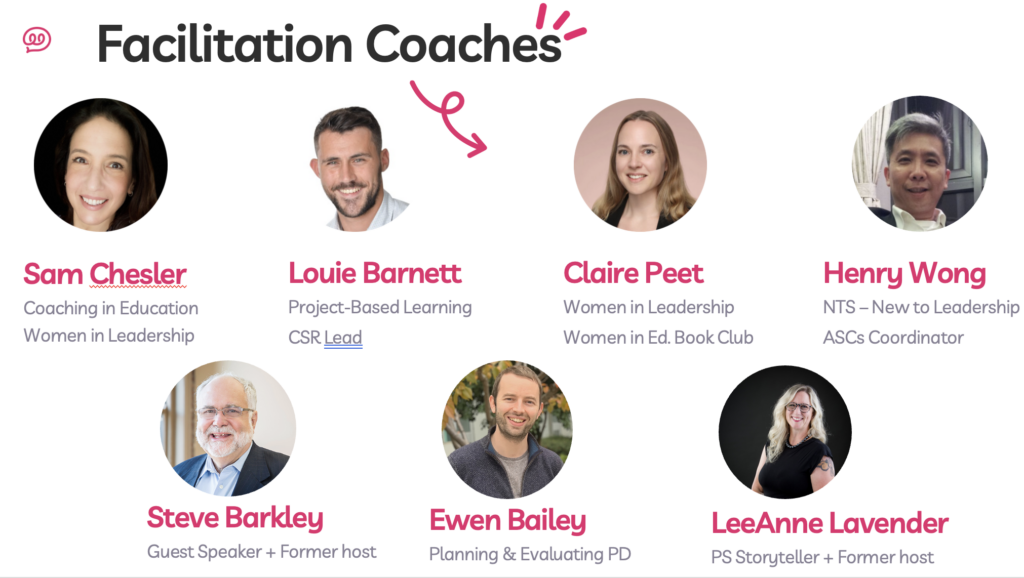
Live Session Elements:
| Live Session Theme | Description |
| Peer Presentations | Identify a theme for your session and send out a request for presenters within your community. Have 2x peer presentations before a structured breakout for members to debrief. Then repeat for 2 more peer presentations. Wrap up with a reflection activity.Tried and tested by Erin Wilson (Librarians) |
| Expert Interview | Identify a specific topic for a session and identify an expert within your community (or a volunteer from outside) to be interviewed about it. Encourage members to share their questions before the session. Draft some key questions and let the conversation begin! Factor in 15-20mins break out afterwards for small groups to debrief and discuss further, before coming back for final Qs & reflection.Tried and tested by Ewen Bailey (Planning & Evaluating PD) |
| Mini Workshop | If you have a relevant skill that is of interest to many in your community, deliver a short workshop about it. Allow significant time for members to engage with the materials and discuss in breakout rooms. Tried and tested by Henry Wong (Business Managers) |
| Professional Inquiry | Collaboration with Huddle Up that allows for small groups to set goals / professional inquiries that they can track. See below for more details… |
Asynchronous Engagement Ideas:
If you’re looking for a spark to get you engaging with your community, here’s a few ideas for things you could post on your newsfeed. You might want to set a reminder to plan and post them every week/fortnight/month. I’m a member of another online community that has
used prompts like these to great effect – The engagement is fantastic, but it took time and consistency to get the results.
| Discussion Prompt | Description |
| Monday’s Motion | Share a provocation to spark debate about a relevant topic. It should be something of interest you and likely to surface differing views amongst members. E.g. for my PD Community:
|
| Weekend Wondering | Ask a question about what participants think their specialism should/could be like or what is driving a problemright now:
|
| Reality Check | “What’s your biggest challenge this week/month/year?
“Share a GIF that sums up your week so far” |
| Recommended Reading | Share a relevant article and invite comments. E.g. “After reading, share something that:
|
| NOGs (note of gratitude) | Share some love about something specific that an individual or group has done. Encourage others to do the same. This is a great way to build rapport |
Creativity and experimentation
This is our third year after building 40 successful communities last year, and many of our communities this year will be brand new. We have plenty of experience in running similar groups and have a good idea of what will make these successful.
However, there is so much potential for collaborative peer learning and we are very keen to give you liscence to be creative and experiment with your community. Therefore, as long as you are meeting the baseline expectations, please do try things out and share what you learn from it in our Hosts community on Peer-Sphere.com!
Communication Channels
- Peer-Sphere.com – The main platform for discussion and resource sharing. We’ve built this platform to ensure the structure matches our needs. Each Community will have its own private members’ section with the following key features:
- News feed, which is a typical social media newsfeed, like Facebook, but exclusively for your community. Anyone in the class can start a discussion and reply or like comments.
- Discussions allow for themed discussions, like an old-school forum. This is a great place to organise discussions and resources (e.g. ‘Live Session 1’)
- Group messaging – This is the best way to message all your members at once. They will receive an email notification when you message here. We can’t share email lists so we recommend using this feature when announcing plans for each session.
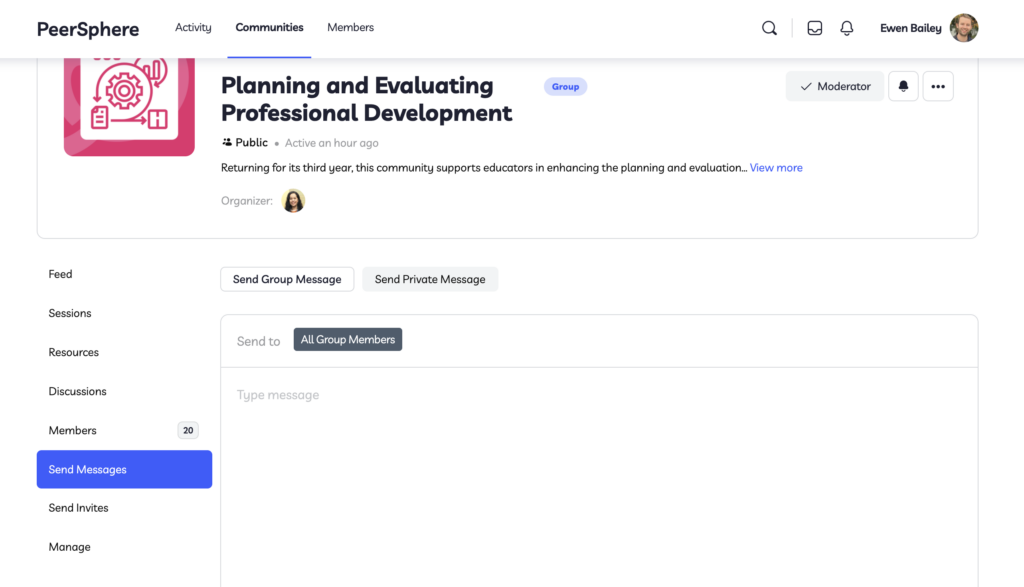
- Direct messaging (DM) – In the same place as the Group Message feature, anyone within a community can DM anyone else. These private chats could be used for developing ideas in more depth or private connections.
- Docs and Media for sharing resources
- Members list with individual profile information
- Sessions is where participants can access the live sessions, RSVP, and find a link to discussions and resources.
- MS Teams will be used for the live sessions because it has the most reliable software for using in China without a VPN. The PeerSphere MS Teams account will host all the live sessions on PeerSphere.com, meaning members can access everything they need on our platform. All the MS Teams links are available in the Sessions section of your community on Peer-Sphere.com
- Email – This is for occasional official communications from PeerSphere to all members in your community. For example, introducing your community and event reminders for each live session. We cannot share members’ email addresses with hosts. See Group Messaging above for how to send the equivalent of an email.
Note that there is an additional community for hosts. This will be for our own communication, sharing of good practice, and support.
- A note on WeChat: WeChat will not be an endorsed platform for PeerSphere. Whilst it is the dominant messaging app in China, it doesn’t have the features for effective discussion threads that our communities need, and we do not want to pull participants away from our platform. Therefore, participants are welcome to create an unofficial WeChat group (and you can be a member of it if you wish). But it is not an official communication channel and PeerSphere will not be responsible for anything posted there.
Notification settings update Nov 2024
We are excited to launch a new daily notifications digest feature!
Before: Previously, you would receive an email for every single comment or reply within communities. We had heard from many of you that this could get overwhelming.
After: You will receive 1 daily digest email. This means that instead of receiving an email every time there is a comment in on of your communities, you will receive a daily round up that covers all of them. However, inside the platform you will still be able to see web notifications for each comment. You can also change these settings yourself more easily, see below for more information.
Good to know
- This does not impact the Session reminder emails
- This does not impact direct messaging within the platform
- Please let us know how you find this feature so we can learn and grow together. Email us at [email protected]!
- If you still prefer to receive an email for every comment, you are able to manually change this back for yourself.
- Navigate to Account – Notification settings inside the platform.
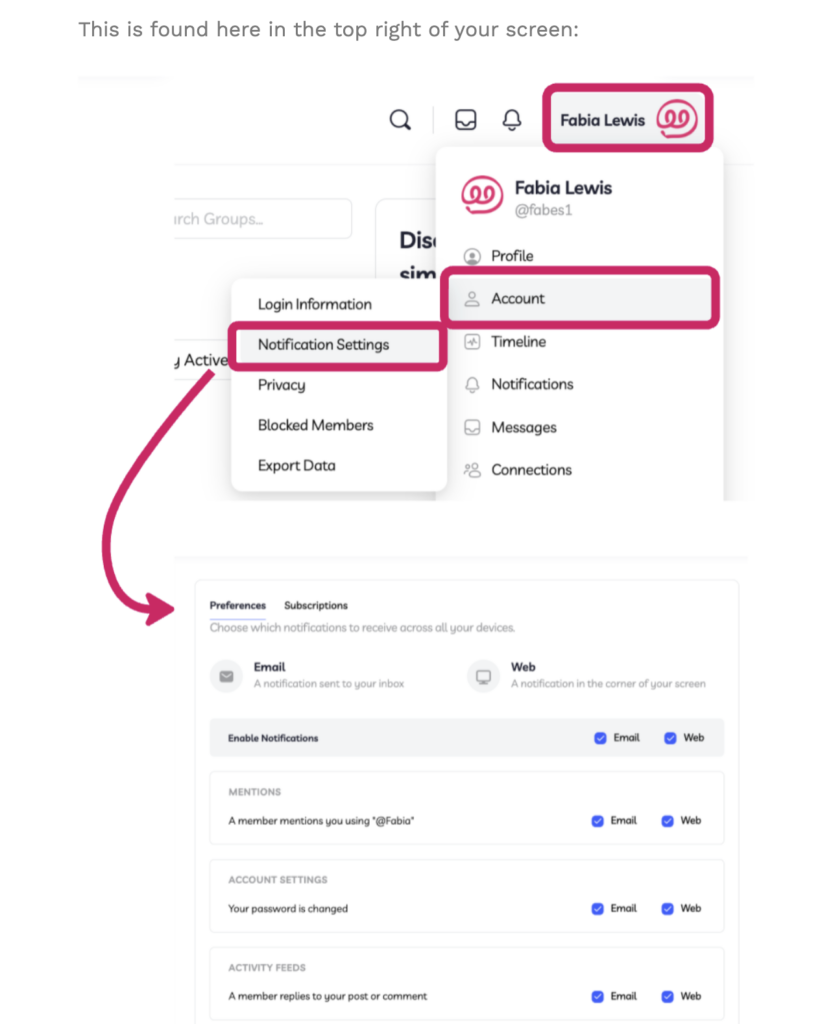



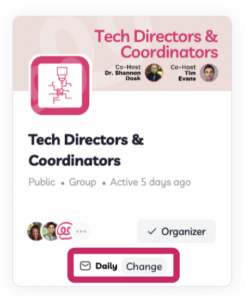
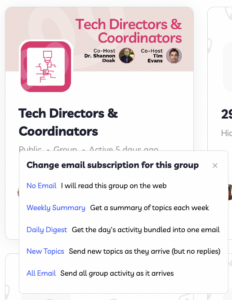
Norms and moderation:
